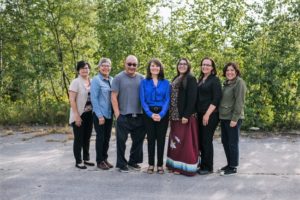Atikameksheng Anishnawbek calls for federal government to approve recently ratified custom election code

By Rick Garrick
ATIKAMEKSHENG ANISHNAWBEK — Atikameksheng Anishnawbek is calling for the federal government to approve its recently ratified custom election code so citizens can vote online for the upcoming Chief and Council election during the coronavirus disease 2019 (COVID-19) pandemic.
“We really see this as part of our pandemic planning with what is happening with our election,” says Atikameksheng Anishnawbek Gimaa Valerie Richer during an Apr. 9 telephone interview. “We were working towards our own custom election code. We finished our work on it in December and we sent it to ISC (Indigenous Services Canada) for a review and they required us to make some changes in some cases.”
Gimaa Richer says the community then received permission from ISC to proceed and held a ratification vote on Jan. 30 where the custom election code was approved by the community.
“Ever since then, we’ve been waiting for the minister to sign off on it,” Gimaa Richer says. “And then what happened is we headed into the pandemic and it is even more important to us. It allows us to vote online so people can vote from the safety of their living rooms as opposed to an Indian Act election.”
Gimaa Richer says the community received a notification from ISC that they would help the community if they wanted to postpone the election currently scheduled for Jun. 27. She noted concerns about a governance gap if the community does not have an elected Chief and Council in place.
“But we have a better alternative to that,” Gimaa Richer says. “We have a way to keep people safe and still proceed with our election by voting at home.”
Gimaa Richer says the community’s election nomination meeting is scheduled for Apr. 23.
“To us, we’ve already received direction from our community and we are moving ahead,” she says. “The election has already been called. We appointed our electoral officer, the election has been called, all the notices went out for the nomination meeting, the nomination meeting is happening April 23.”
Gimaa Richer says the community is trying to avoid meeting in person due to COVID-19, so nomination forms were mailed to off-reserve citizens and delivered to homes in the community.
“So people don’t have to come out and we are going to stream the nomination meeting also,” Gimaa Richer says. “You have to accept your nomination and you have to put down, under our code, a $25 non-refundable deposit. That has to be by April 30, so we will know by May 1 all the people who have accepted to run for Chief and Council.”
With the health risks top of mind, Gimaa Richer continues to monitor this situation closely as regulations change and information becomes available.
“No one from ISC has contacted me,” she notes in an e-mail on Apr. 16. “All of my e-mails for an update have not been returned from anyone at ISC and I only heard of these new regulations from news coverage.”
A spokesperson for ISC says in an Apr. 15 e-mail comment that ISC Minister Marc Miller recognizes the health risks of holding elections during the COVID-19 pandemic.
“The Government of Canada has developed a regulatory option that will allow First Nations leaders to postpone or to cancel their upcoming election while continuing to exercise their roles and duties within their communities for up to six months, with a potential second extension of six months,” says Leslie Michelson, Media Relations, ISC. “While the decision of whether to hold scheduled elections in the current context of the spread of COVID-19 remains with the community leaders, Atikameksheng Anishnawbek now has the option to delay their election, while ISC is working to finalize the changes on their election code, leading to the community conversion to a custom election code. Unfortunately, the current health context has affected the timing of the approval process. Indigenous Services Canada is in contact with Chief Richer to advise of these developments.”


